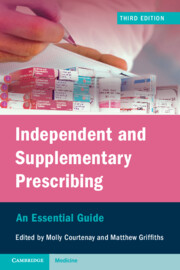Book contents
- Frontmatter
- Contents
- List of Contributors
- Foreword
- Preface
- 1 Non-Medical Prescribing: An Overview
- 2 Non-Medical Prescribing in a Multidisciplinary Team Context
- 3 Consultation Skills and Decision Making
- 4 Legal Aspects of Independent and Supplementary Prescribing
- 5 Ethical Issues in Independent and Supplementary Prescribing
- 6 Psychology and Sociology of Prescribing
- 7 Applied Pharmacology
- 8 Monitoring Skills
- 9 Promoting Concordance in Prescribing Interactions
- 10 Evidence-Based Prescribing
- 11 Extended/Supplementary Prescribing: A Public Health Perspective
- 12 Calculation Skills
- 13 Prescribing in Practice: How It Works
- 14 Minimising the Risk of Prescribing Error
- 15 Education and Training to Become a Prescriber
- 16 Antimicrobial Prescribing
- Index
13 - Prescribing in Practice: How It Works
Published online by Cambridge University Press: 23 December 2021
- Frontmatter
- Contents
- List of Contributors
- Foreword
- Preface
- 1 Non-Medical Prescribing: An Overview
- 2 Non-Medical Prescribing in a Multidisciplinary Team Context
- 3 Consultation Skills and Decision Making
- 4 Legal Aspects of Independent and Supplementary Prescribing
- 5 Ethical Issues in Independent and Supplementary Prescribing
- 6 Psychology and Sociology of Prescribing
- 7 Applied Pharmacology
- 8 Monitoring Skills
- 9 Promoting Concordance in Prescribing Interactions
- 10 Evidence-Based Prescribing
- 11 Extended/Supplementary Prescribing: A Public Health Perspective
- 12 Calculation Skills
- 13 Prescribing in Practice: How It Works
- 14 Minimising the Risk of Prescribing Error
- 15 Education and Training to Become a Prescriber
- 16 Antimicrobial Prescribing
- Index
Summary
This chapter describes how independent and supplementary prescribing can be used by non-medical prescribers in the treatment management of patients with dermatological conditions. Valuable insights are provided into the burden of skin conditions in healthcare today. Skin assessment using a biopsychosocial approach is addressed and discussion on how skin assessment influences prescribing decisions for topical and systemic treatments in primary care and the community. Three main principles of management are presented using atopic eczema, psoriasis and acne as examples, with a key focus on prescribing considerations. Remote prescribing is also discussed highlighting the 10 principles of safe and effective prescribing practice when traditional face-to-face consultations are not available. This chapter aims to optimise the decision-making skills of the non-medical practitioners involved in prescribing for common skin conditions
Keywords
- Type
- Chapter
- Information
- Independent and Supplementary PrescribingAn Essential Guide, pp. 263 - 275Publisher: Cambridge University PressPrint publication year: 2022

